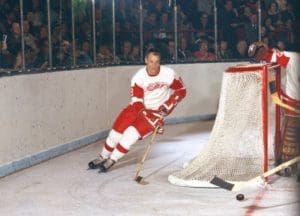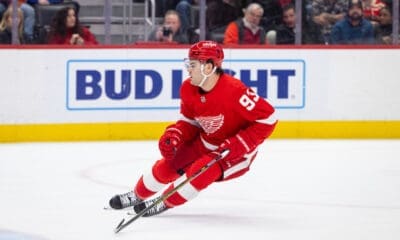Detroit Red Wings
Great Red Wings Performances That Need to be Talked About More
Five tremendous Detroit performances that are overlooked

Some moments in Detroit Red Wings history are frequently the cause for celebration. Gordie Howe reaching 700 goals. Sergei Fedorov’s five-goal game. Steve Yzerman’s 65-goal, 155-point campaign.
However, there are several other magical campaigns that have been delivered by Red Wings players over the many years in franchise history that have been lost in time. These moments are equally worthy of celebration, and we’ve cataloged them all right here for your perusual.
Bob Probert’s Red Wings PIM Mark
Bob Probert’s legacy in Hockeytown is timeless. His fights are the stuff of legend. As his 1987-88 Red Wings season also should be. During the 1987-88 season, Probert wound up one goal shy of 30 and two PIM shy of 400. He would serve the equivalent of 6.63 games in penalty minutes and still find enough ice to to score 29 goals.
Looks like Bob Probert wore the over/under on his PIM while playing for the Windsor Minor Hockey Association. pic.twitter.com/CLbixmDQvU
— The Hockey Samurai 侍 (@hockey_samurai) August 5, 2024
It was good enough to earn Probert a place in the NHL All-Star Game that season. And, a look of puzzlement from Joe Kocur, his Bruise Brothers teammate.
Kocur would never let Probert forget that all he had to do was hack some opponent in the last game of the season to get to the 400-minute plateau.
Frank Mahovlich’s 49 Goals
There were some record-setting performances turned in by Red Wings players during the 1968-69 season. Already past his 40th birthday, Gordie Howe would collect a career-high 103 points to become the first Detroit player to top the century mark.
Linemate Frank Mahovlich would be enjoying a record-tying year. Playing with Howe and Alex Delvecchio is what was basically the final iteration of the Production Line, Mahovlich scored 49 goals. That would tie the club mark set by Howe all the way back in 1952-53.
Mickey Redmond would become Detroit’s first 50-goal scorer in 1972-73 and everyone would forget about Mahovlich’s remarkable season.
Red Wings D Sets Goal Standard
Much like his nickname, Bill “Flash” Hollett’s Red Wings career would be over in a flash. His arrival came via a trade with Boston midway through the 1943-44 season. Hollett’s NHL days would end in 1946. During that Detroit tenure, he’d set a long-forgotten NHL record.
During the 1944-45 season, Hollett would score 20 goals. He was the first defenseman in NHL history to enjoy a 20-goal campaign.
That mark would stand until 1968-69, when Bobby Orr tallied 21 goals for the Bruins.
Mr. Hockey Breaks His Own Record
It seems silly to suggest that something could be overlooked during Howe’s one-of-a-kind career. However, it’s true. There isn’t enough said about his spectacular 1952-53 season.
Mr. Hockey came into that season as the holder for the single-season NHL points mark. He set it with 86 points in 1950-51 and equaled that mark in 1951-52. However, in 1952-53, he’d completely obliterate his own standard.

That season, Howe would score 49 goals and tabulate 95 points. For years, there was speculation that Howe actually scored 50 goals, tipping in a Red Kelly point shot. But he insisted to officials that it was Kelly’s goal. Howe knew that Red was working toward a goal-scoring bonus in his contract.
Regardless, not only was his 95-point season a new NHL mark, it would be another six seasons before another NHLer would climb to the 90-point plateau. No player would better Howe’s single-season total until Chicago’s Bobby Hull collected 97 points in 1965-66.
Quackenbush Avoids Sin Bin
The perfect performance to bookend Probert’s 398 PIM season is the 1948-49 campaign of Red Wings defenseman Bill Quackenbush. He’d play the entire 60-game schedule that season in Detroit’s top defense pairing and never be assessed a single penalty.
All Star Bill Quackenbush, one of the great all-time names, played 131 consecutive games without a penalty. After the NHL, at Princeton University he coached 8 Ivy League titles with the men's golf team & 3 with the women's hockey team. pic.twitter.com/MRrJLn36ZB
— The Hockey Samurai 侍 (@hockey_samurai) April 18, 2023
For his gentlemanly play, Quackenbush would win the Lady Byng Trophy – the first defenseman to gain such recognition – and incur the wrath of Red Wings GM Jack Adams. Stating a preference for rugged rearguards, he’d trade Quackenbush to Boston in the offseason.
“They are substituting the Byng for bang in hockey,” Adams groused to the Montreal Gazette. “The Lady Byng winners have taken over.”















